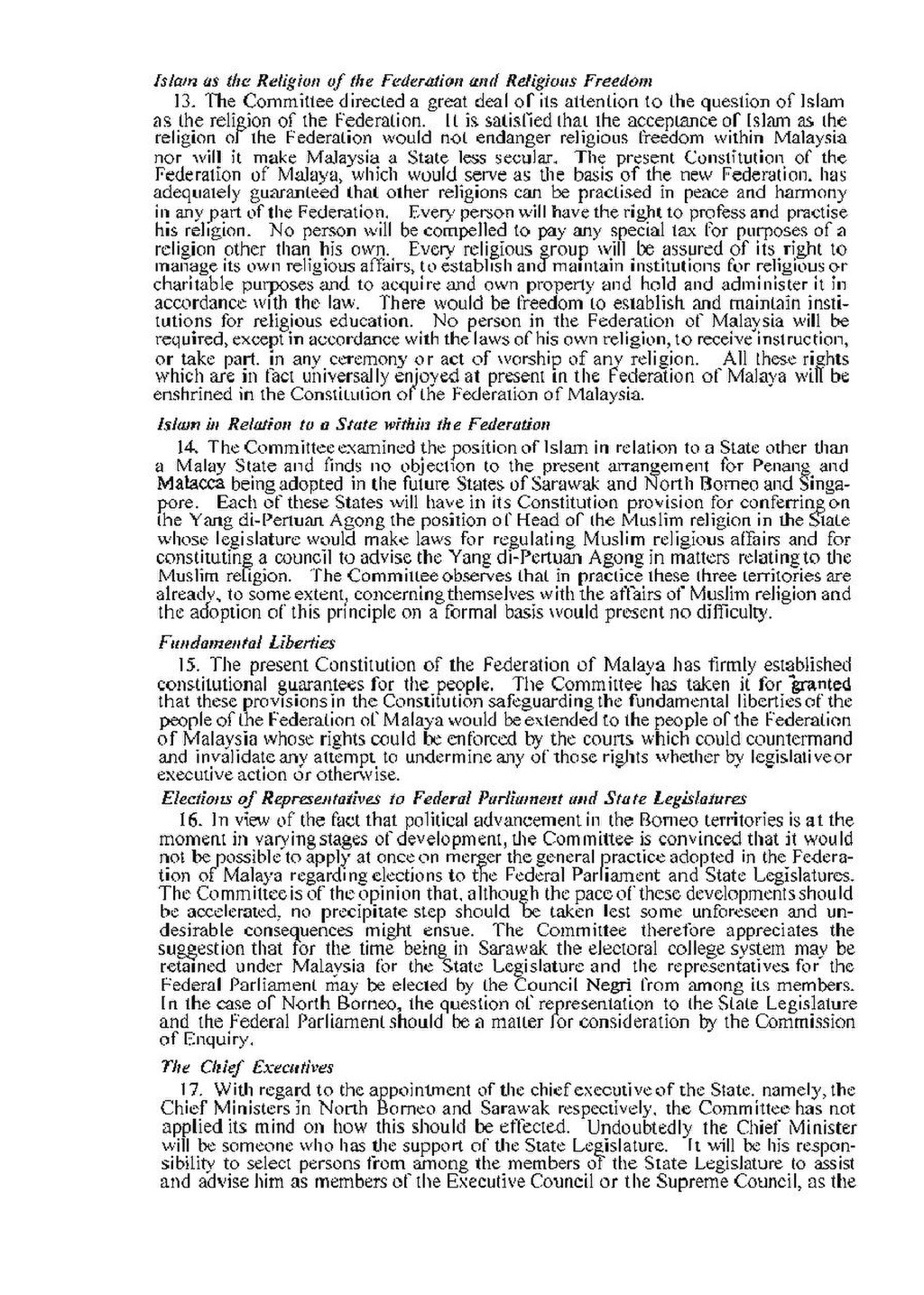Islam as the Religion of the Federation and Religious Freedom
13. The Committee directed a great deal of its attention to the question of Islam as the religion of the Federation. It is satisfied that the acceptance of Islam as the religion of the Federation would not endanger religious Freedom within Malaysia nor will it make Malaysia a State less secular. The present Constitution of the Federation of Malaysia, which would serve as the basis of the new Federation, has adequately guaranteed that other religions can be practised in peace and harmony in any part of the Federation. Every person will have the right to profess and practise his religion. No person will be compelled to pay any special tax for purposes of a religion other than his own. Every religious group will be assured of its right to manage its own religious affairs to establish and maintain institutions for religious or charitable purposes and to acquire and own property and hold and administer it in accordance with the law. There would be freedom to establish and maintain institution for religious education. No person in the Federation of Malaysia will be required except in accordance with the laws of his own religion, to receive instruction, or take part in any ceremony or act of worship of any religion. All these rights which are in fact universally enjoyed at present in the Federation of Malaya will be enshrined in the Constitution of the Federation of Malaysia.
Islam in Relation to a State within the federation
14. The Committee examined the position of Islam in relation to a State other than a Malay State and finds no objection to the present arrangement for Penang and Malacca being adopted in the future States of Sarawak and North Borneo, and Singapore. Each of these States will have in its Contitution provision for confering on the Yang di-Pertuan Agong the position of Head of the Muslim religion in the State whose legislature would make laws for regulating Muslim religious affairs for constituting a coucil to advise the Yang di-Pertuan Agong in matters relating to the Muslim religion. The Committee obseves that in pratice these three territories are already to some extent concerning themselves with affairs of Muslim religion and the adoption of this principle on a formal basis would present no difficulty.
Fundamental liberties
15. The present Constitution of the Federation of Malaya has firmly established constitutional guarantees for the people. The Committee has taken it for granted that these provisions in the Constitution safeguarding the fundamental liberties of the people of the Federation of Malaya would be extended to the people of the Federation of Malaysia whose rights could be enforced by the courts which could countermand and invalidate any attempt to undermine any of those rights whether by legislative or executive action or otherwise
Elections of Representatives to the Federation Parliament and State Legislature
16. In view of the fact that political advancement in the Bomeo territories is at the moment in varying stages of development, the Committee is convinced that it would not be possible to apply at once on merger the general practice adopted in the Federa- tion of Malaya regarding elections to the Federal Parliament and State Legislatures. The Committee is of the opinion that, although the pace of these developments should be accelerated, no precipitate step should be taken lest some unforeseen and un- desirable consequences might ensue. The Committee therefore appreciates the suggestion that for the time being in Sarawak the electoral college system may be retained under Malaysia for the State Legislature and the representatives for the Federal Parliament may be elected by the Council Negri from among its members. In the case of North Borneo, the question of representation to the State Legislature and the Federal Parliament should be a matter for consideration by the Commission of Enquiry.
The Chief Executives
17. With regard to the appointment of the chief executive of the State. namely, the Chief Ministers in North Borneo and Sarawak respectively, the Committee has not applied its mind on how this should be effected. Undoubtedly the Chief Minister will be someone who has the support of the State Legislature. It will be his respon- sibility to select persons from among the members of the State Legislature to assist and advise him as members of the Executive Council or the Supreme Council, as the
